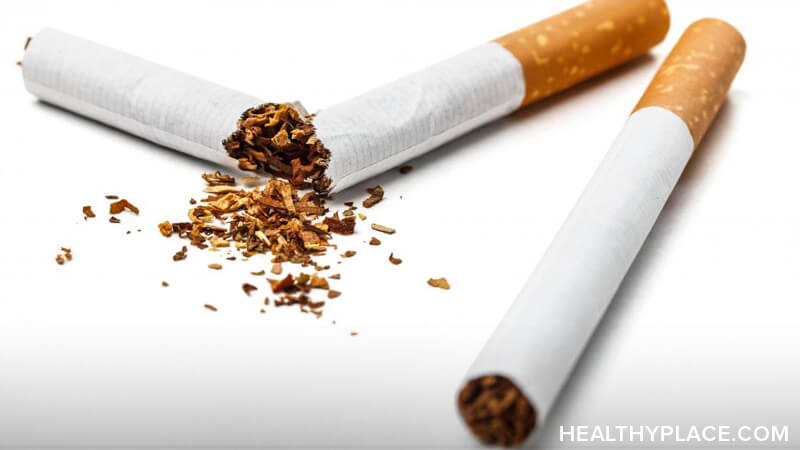Nicotine Withdrawal and How to Cope with Nicotine Withdrawal Symptoms

When people try to give up smoking, they will experience both psychological and physical nicotine withdrawal symptoms. Learn about the symptoms of nicotine withdrawl and how to deal with them.
Smokers know about it before they ever even think about quitting smoking - the nicotine withdrawal symptoms. They've seen friends and family go through the same thing. The physical and psychological withdrawal symptoms of nicotine can be a real ordeal for some quitters. The whole process of quitting smoking means a total change in lifestyle. Those cigarette breaks at work are gone. That smoke at the end of your meal is over. Sipping a drink in a bar while "enjoying" a few smokes is also going to be a thing of the past. Sitting around gabbing with friends over coffee with a few ciggies is also going to have to go the way of the dinosaurs. This major social upheaval scares the life out of most people - some to the point they refuse to quit smoking. When faced with withdrawal symptoms, a nicotine addiction doesn't seem that bad.
Physical Withdrawl Symptoms From Nicotine and Cigarette Smoking
Physical nicotine withdrawal symptoms can be far worse than the psychological problems though. Nicotine is an extremely powerful drug with the same addictive qualities as both cocaine and morphine. For example, the 12-month success rate for somebody who has quit heroin is double that of nicotine addicts. People can quit using heroin twice as often as smokers can quit smoking. Scary eh?
Nicotine affects the neurotransmitters of the brain. Your brain gets used to receiving this form of stimulation and will start sending out signals of craving when the source of stimulation is stopped or reduced i.e. you're not smoking at that point in time. This craving is hard to put into words. It's like your body is thirsting for water it can't have. It's a gnawing desire in the pit of your stomach for just one more cigarette. Only smokers, you know - the ones who seem addicted to nicotine - can understand this.
Quitters experience a wide range of nicotine withdrawal symptoms over and above the basic craving (although the craving in itself is more than enough to have to deal with). The fear and scare stories of these withdrawal symptoms are often enough to put more smokers off before even trying to kick the habit. The nicotine withdrawal symptoms can be traumatic but they will not cause you any physical harm.
Nicotine Withdrawl Symptoms
Here are some of the symptoms of nicotine withdrawal:
- Irritability (sometimes extreme)
- Insomnia (unable to sleep)
- Headaches
- Coughing
- Cold and flu symptoms
- Chest infections
- Dry mouth, lips or tongue
- Sore throat
- Nausea
- Extreme tiredness
- Lack of concentration
- Massive increase in appetite
The longer you smoke the more acute these withdrawal symptoms tend to be.
The symptoms of nicotine withdrawal can be alleviated with nicotine substitutes such as nicotine gum or patches. This can help overcome the habit of smoking and it may be easier to cut down on these kinds of secondary nicotine sources than it is by quitting smoking cold turkey. Some types of drugs (particularly antidepressants) can also be used to help lessen the symptoms of nicotine withdrawal. Obviously becoming dependent on another chemical to replace your addiction to nicotine isn't a good idea. You must always have a plan for how you're going to handle the withdrawal itself and especially a cutoff date for when you'll stop using the nicotine substitutes.
Symptoms of Nicotine Withdrawal Do Subside
The great news is that any nicotine withdrawal symptoms you feel will become weaker over time. That initial insatiable craving for a cigarette will quickly become a passing thought. That almost crazy irritability will also fade faster than you imagined possible. You'll be an ocean of calm instead of a hurricane of emotion.
Constipation can also be a problem related to nicotine withdrawal. The digestive system is sensitive to nicotine in the bloodstream. Many smokers are familiar with the sensation of needing to use the bathroom after having a cigarette. The digestive system can become dependent on the stimulation and when you stop smoking this may mean that you become slightly constipated. Just make sure you eat plenty of fruit and bran rich foods to counteract this.
Another common complaint from people trying to quit smoking is that they tend to become sick with a cold, sore throat, flu or chest infection within 14 - 21 days of stopping smoking. A common theory is that your immune system has been so busy fighting off the chemicals in nicotine that it goes into a form of shock when you quit smoking and the cold/flu/chest infection are a result of this. One of the most unpleasant withdrawal symptoms (but definitely the most positive) is when your lungs start to eject all the tar you've consumed. This will mean coughing up green and sometimes black mucus for a period of days or weeks. It's only when you see what your lungs were clogged up that you'll really start to understand just how much damage smoking was doing to you.
Not all quitters suffer from withdrawal though. Some experience no side effects at all. Others experience them but at a much lower level. Regardless of the level of withdrawal "pain" remember that the symptoms will pass and you will be free of nicotine for good.
You will have urges to smoke. These will be very strong initially - almost coming in waves trying to break down your resistance. You'll notice, however, that as the days pass the urges fade and within 6 - 8 weeks that urge will come less and less often until it doesn't bother you anymore. If you get an urge to smoke then go for a walk, a swim or head to the gym. Do something physical to keep you away from smoking.
Remember one thing though. For all the nastiness you have to go through in withdrawal. For all the exercise you took and lifestyle changes you made there is no such thing as an ex-smoker. You will have simply become somebody who chooses not to smoke.
Sources:
- Quitters Guide
APA Reference
Gluck, S.
(2021, December 16). Nicotine Withdrawal and How to Cope with Nicotine Withdrawal Symptoms, HealthyPlace. Retrieved
on 2026, March 5 from https://www.healthyplace.com/addictions/articles/nicotine-withdrawal-and-how-to-cope-with-nicotine-withdrawal-symptoms



